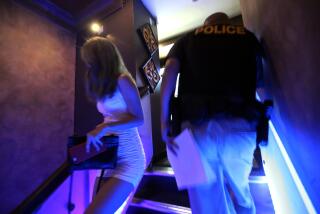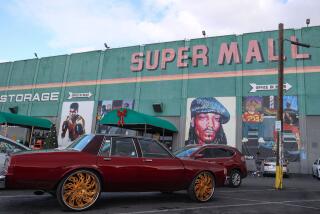No Cause for Thanks : Family Sinking Into Poverty After Market They Owned Was Destroyed by Looters in Riots
Unemployed and deep in debt seven months after their market was burned to the ground by looters in the spring riots, Sung-Chul Pak and his wife, Kwang-Soon Pak, were trying hard to find things to be thankful for on Thanksgiving Day.
“It’s difficult,” Pak said. “We didn’t even have the money to get a turkey this year. There are no toys for the children.”
Seated on an old gray couch in their clean but cluttered one-bedroom apartment in Koreatown, the 35-year-old grocer sighed. “We’ve managed to survive the last six months, but I don’t know how much longer we can live in this limbo,” Pak said as his sons, Briant, 3, and Aaron, who will be 2 next month, played at his feet. “If it weren’t for the children, I don’t think we could’ve made it. We live to see the little ones smile.”
The Paks have a stack of bills but no money coming in. Their $70-a-week federal disaster unemployment assistance stopped this month. They are four months behind in rent; they owe $60,000 on the loan for their burned-out Friendly Market, and they have car and insurance payments. He is trying desperately to persuade his bank to not report his credit problem to TRW.
Friends and relatives take turns bringing the family diapers, milk and kimchi (pickled vegetables). “We’re indebted to so many people; I feel burdened,” he said.
“Until sa-e-gu (April 29), my husband and I had so many dreams,” said Kwang-Soon, 32. “Even though we were always working and lived in this cramped apartment . . . we were happy because we were saving for a home. If they hadn’t burned down our grocery, we would be spending Thanksgiving in our new home in La Crescenta. The escrow was supposed to close on May 2. We lost the $10,000 deposit.”
At 2 a.m. on May 1, Pak and a group of his brother’s friends went to 4660 W. Adams Blvd. to try to protect Friendly Market. But they fled on foot when their car was fired upon and bullets punctured two tires.
The Paks said they lost about $300,000 in the riots. Their insurance policy turned out to be worthless because it was issued by an unlicensed offshore company.
Pak hasn’t been back to the store because the memory is too painful. But his younger brother has and took a picture of the burned-out space between two buildings that still stand.
The photograph, framed in black like pictures used in Korean funerals, hangs on a living room wall. Next to it is a framed verse from the 23rd Psalm in Korean calligraphy. Other Biblical verses hang throughout the apartment.
But since the riots, the couple have not been to church. “I have to admit there are times when I’m angry with God,” Pak said.
Forcing back tears, Kwang-Soon Pak said she has an additional reason for avoiding church. She was two months’ pregnant at the time of the riots, and the tension from the ordeal and financial uncertainties led her to have an abortion in late May. “We didn’t think it would be a responsible thing to bring a child into the world in our financial situation,” she said. But a sense of guilt haunts her.
“The baby’s due date was Dec. 9,” she said. “Every time I see a pregnant lady in our apartment building, I keep thinking about the baby we could’ve had.”
Other Korean grocers in the neighborhood have similar stories. A few blocks from the Paks’ apartment, a dozen unemployed grocers commiserated late into Thanksgiving eve in a small smoke-filled room that serves as the office for the Korean American Grocers Victims’ Assn.
Sung-Ho Joo, president of the 170-member group, said he can’t bear the thought of holidays.
“I am changnam (eldest son) of the family,” he said. “In the Korean culture, it is changnam who hosts holiday gatherings. For us, Thanksgiving this year will be like a wake.
“My little boy brought a notice from school the other day about the Thanksgiving recess. He said, ‘Daddy, I won’t eat turkey.’ He’s only 8, but he won’t ask me to buy him anything these days. When I ask him if he wants a hamburger, he says, ‘Daddy, I don’t want to eat hamburger now. But when you have money, I want to eat it.’ That hurts me more than anything.”
Joo said members of his association are all suffering from oo-ool-jjeung , or depression.
“We are a pretty sturdy bunch, but these days, all of a sudden, we can be watching TV or talking with someone, and we start crying,” he said.
Pak said he sometimes gets up in the night with chest pains.
“When I think of what my family went through--the sacrifices my wife and younger brothers made--to acquire the business, I just want to grab those people who did this to us and choke them.”
Pak still doesn’t understand why his store was singled out.
“All we did was work hard,” he said. “Is it a crime to work hard? In our neighborhood, there were four markets. Mine was the only one that was destroyed. The other stores were black-owned.”
The irony is that he and his wife got along well with customers, he said. “I’m a friendly, outgoing man by nature. We never had any problem at the store. I often gave food on credit. I made deliveries for my customers who couldn’t come to the store. I sometimes wonder how some of the old people in wheelchairs are getting along without me delivering their groceries. They must have a hard time.”
Sung-Il Lim, whose 7,000-square-foot market in Watts was looted while “police stood and just watched,” said politicians, the news media and so-called community leaders are all part of the problem.
“When I see religious leaders from black and Korean communities holding meetings to talk about racial harmony, I want to laugh because it’s so ludicrous,” he said. “What good does sending a group of black ministers on a trip to Korea do for us? Until there is an apology by those who destroyed our businesses and our lives, there can be no dialogue. I think it’s time for people to speak the truth.”
More to Read
Sign up for Essential California
The most important California stories and recommendations in your inbox every morning.
You may occasionally receive promotional content from the Los Angeles Times.










